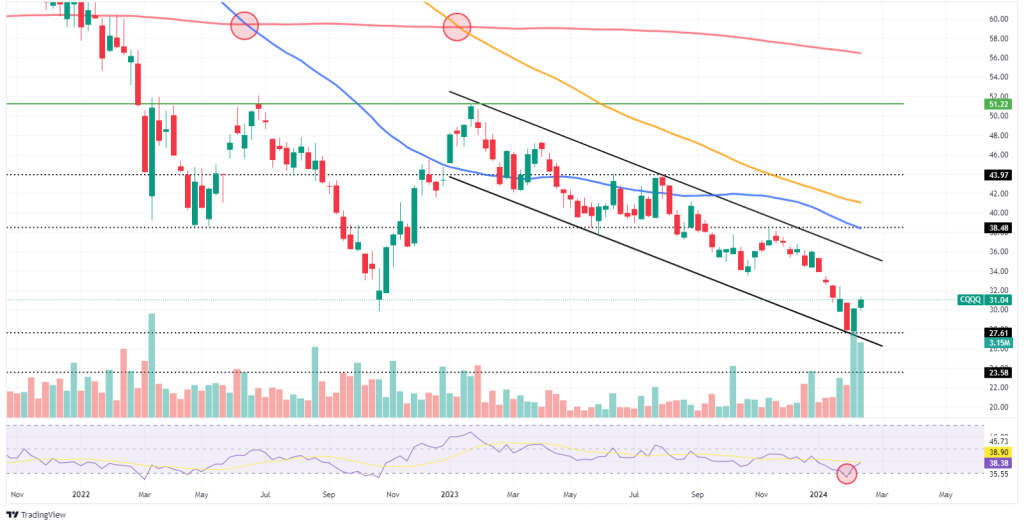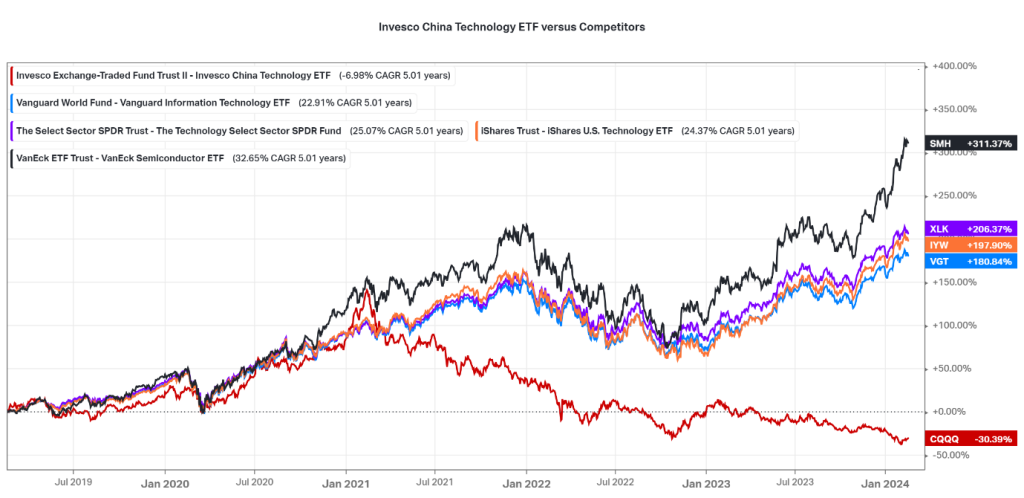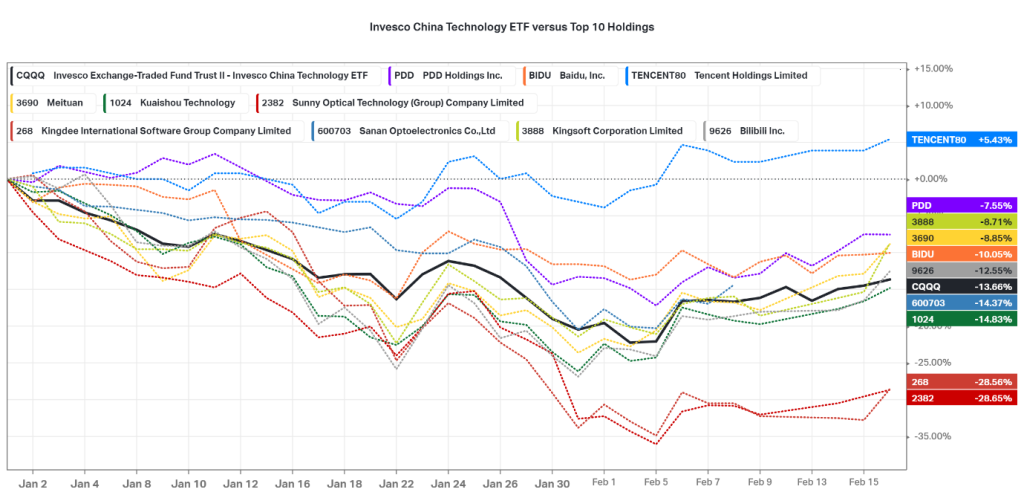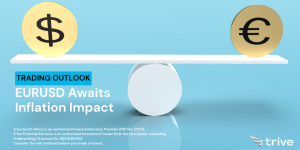
The Invesco China Technology ETF (NYSE: CQQQ) has been on a rollercoaster ride in 2024, mirroring the broader struggles of the Chinese tech sector. Year-to-date, the ETF is down over 12%, grappling with regulatory headwinds, a slowing economy, and geopolitical tensions. While a recent technical upswing offers a glimmer of hope, fundamental factors suggest a challenging road ahead for CQQQ.
Technical Analysis
CQQQ’s one-week chart paints a picture of a potential short-term rally within a larger bearish trend. The share price sits above the descending channel’s lower boundary, indicating a bounce from recent lows. However, key moving averages [50-SMA (blue line), 100-SMA (orange line), 200-SMA (red line)] all trend downwards, highlighting the dominant bearish sentiment.
The rising Relative Strength Index (RSI) suggests a potential break out of oversold territory, and receding volumes hint at a possible sustained upward push. A breach of the channel’s resistance at $34.48 could trigger further buying towards the last swing high of $38.48, with subsequent resistance levels at $43.97 and $51.22.
However, failure to sustain a push higher could offer short-term trading opportunities towards the initial support at $27.61. The next significant level lower lies at the $23.58 support level.

Fundamental
In evaluating CQQQ’s recent performance, it is crucial to compare it with competitors and scrutinize its top 10 constituents. Despite its year-to-date decline, CQQQ’s competitors, including Vanguard Information Technology ETF and The Technology Select Sector SPDR Fund, have demonstrated positive returns. This indicates a relative underperformance, potentially attributed to China’s economic challenges and regulatory uncertainties.

Invesco China Technology ETF (CQQQ) has faced a challenging market landscape compared to its competitors in the technology sector. While CQQQ is down 12.12% year-to-date, competitors like Vanguard Information Technology ETF and The Technology Select Sector SPDR Fund have demonstrated positive returns, highlighting a relative underperformance. The contrasting performances can be attributed to several factors affecting the Chinese technology sector.
China’s economic challenges, including a deflationary environment and property market troubles, have created headwinds for CQQQ. Geopolitical tensions, particularly concerns about China’s potential invasion of Taiwan, have raised speculation about the country’s exclusion from the global financial system, contributing to the overall difficulties faced by China-tech ETFs.
Moreover, regulatory uncertainties and a crackdown on tech giants like Alibaba and Tencent have dampened investor sentiment, impacting CQQQ’s performance. The regulatory tightening, coupled with global market volatility driven by rising interest rates and inflation fears, has created a risk-off sentiment affecting not only CQQQ but the broader technology sector.
CQQQ’s underperformance compared to its competitors reflects the intricate challenges posed by a combination of economic, geopolitical, and regulatory factors affecting the Chinese technology landscape.
Top 10 Constituents: A Microcosm of Challenges
The top 10 holdings, representing 53.14% of total assets, have all faced considerable declines, with Tencent, PDD Holdings, and Baidu experiencing notable setbacks. Regulatory crackdowns, economic slowdown concerns, and global market volatility have contributed to the downward trend.

An analysis of CQQQ’s top 10 holdings reveals a microcosm of the issues plaguing the Chinese tech sector. The top 10 holdings, comprising over half of CQQQ’s total assets, have collectively experienced significant declines; all but one constituent are currently in the red, with declines ranging from 5% to a staggering 30%, with PDD Holdings and Baidu leading the downturn.
Several factors contribute to this lacklustre performance. China’s regulatory crackdown on tech giants, exemplified by intensified scrutiny on companies like Tencent and Baidu, has dampened investor sentiment. Concerns about an economic slowdown in China, exacerbated by challenges in the property market, further weigh on tech stocks. Additionally, global market volatility, driven by rising interest rates and inflation fears, has created a broader risk-off sentiment impacting CQQQ and its constituents.
CQQQ’s underwhelming performance reflects a confluence of regulatory uncertainties, economic concerns, and global market dynamics. While each holding has its unique strengths and weaknesses, the overall picture remains cautious.
Summary
The Invesco China Technology ETF presents a complex investment proposition. While a recent technical upswing offers a potential short-term trading opportunity, fundamental factors suggest continued headwinds for the Chinese tech sector.
Sources: TradingView, KoyFin, Business Insider, Trackinsight, ETF Stream, Interactive Investor.
Piece written by Mfanafuthi Mhlongo, Trive Financial Market Analyst
Disclaimer: Trive South Africa (Pty) Ltd (hereinafter referred to as “Trive SA”), with registration number 2005/011130/07, is an authorised Financial Services Provider in terms of the Financial Advisory and Intermediary Services Act, 37 of 2002. Trive SA is authorised and regulated by the South African Financial Sector Conduct Authority (FSCA) and holds FSP number 27231. Trive Financial Services Ltd (hereinafter referred to as “Trive MU”) holds an Investment Dealer (Full-Service Dealer, excluding Underwriting) Licence with licence number GB21026295 pursuant to section 29 of the Securities Act 2005, Rule 4 of the Securities Rules 2007, and the Financial Services Rules 2008. Trive MU is authorized and regulated by the Mauritius Financial Services Commission (FSC) and holds Global Business Licence number GB21026295 under Section 72(6) of the Financial Services Act. Trive SA and Trive MU are collectively known and referred to as “Trive Africa”.
Market and economic conditions are subject to sudden change which may have a material impact on the outcome of financial instruments and may not be suitable for all investors. Trive Africa and its employees assume no liability for any loss or damage (direct, indirect, consequential, or inconsequential) that may be suffered. Please consider the risks involved before you trade or invest. All trades on the Trive Africa platform are subject to the legal terms and conditions to which you agree to be bound. Brand Logos are owned by the respective companies and not by Trive Africa. The use of a company’s brand logo does not represent an endorsement of Trive Africa by the company, nor an endorsement of the company by Trive Africa, nor does it necessarily imply any contractual relationship. Images are for illustrative purposes only and past performance is not necessarily an indication of future performance. No services are offered to stateless persons, persons under the age of 18 years, persons and/or residents of sanctioned countries or any other jurisdiction where the distribution of leveraged instruments is prohibited, and citizens of any state or country where it may be against the law of that country to trade with a South African and/or Mauritius based company and/or where the services are not made available by Trive Africa to hold an account with us. In any case, above all, it is your responsibility to avoid contravening any legislation in the country from where you are at the time.
CFDs and other margin products are complex instruments and come with a high risk of losing money rapidly due to leverage. You should consider whether you understand how these products work and whether you can afford to take the high risk of losing your money. Professional clients can lose more than they deposit. See our full Risk Disclosure and Terms of Business for further details. Some or all of the services and products are not offered to citizens or residents of certain jurisdictions where international sanctions or local regulatory requirements restrict or prohibit them.




